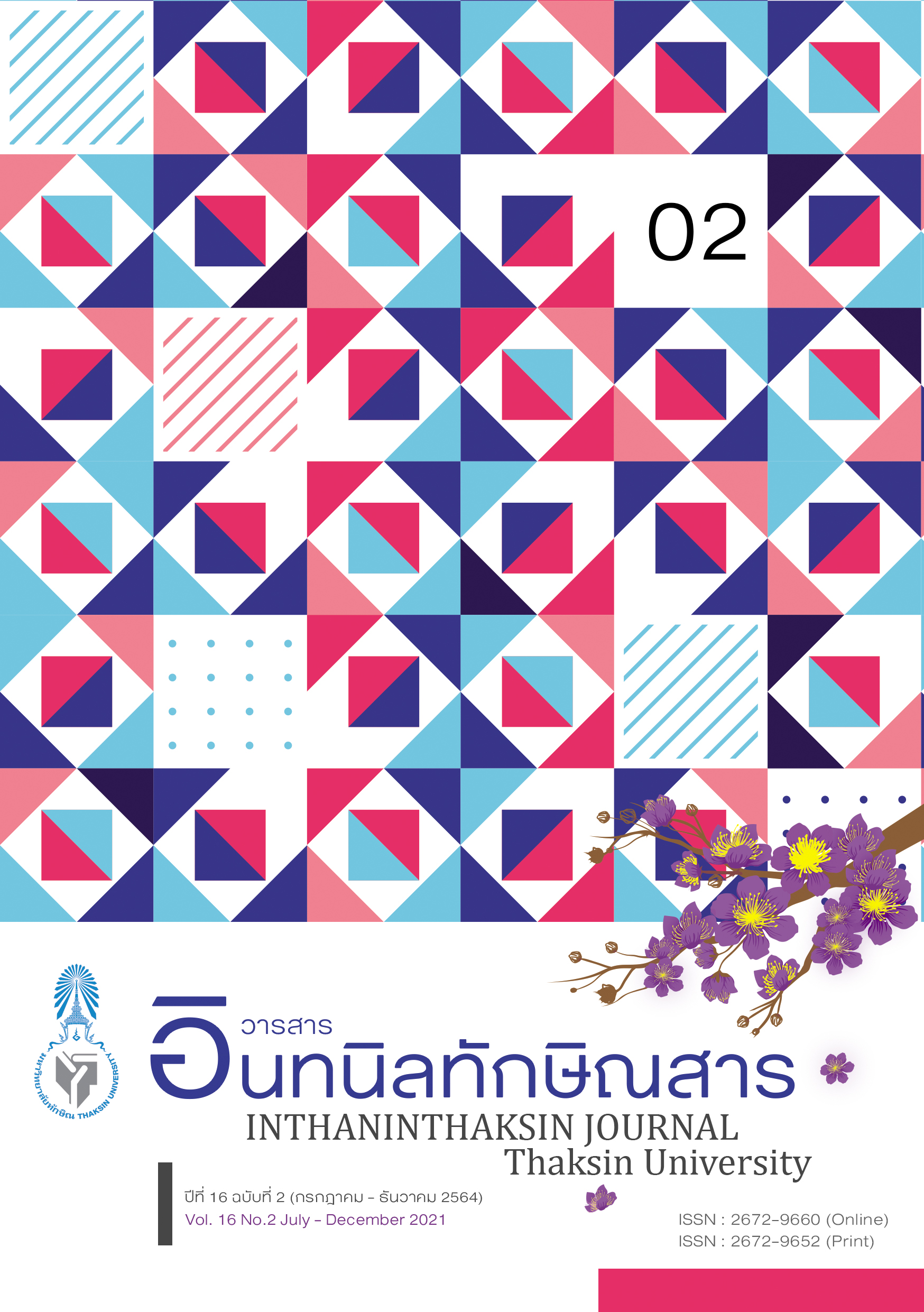ปัจจัยภายในที่เป็นอุปสรรคต่อทักษะการพูดภาษาอังกฤษของนักเรียนนักศึกษาไทย: อิทธิพลจากแนวคิดเชิงวัฒนธรรมไทย
Main Article Content
บทคัดย่อ
ในยุคโลกาภิวัตน์ ทักษะภาษาอังกฤษที่มีประสิทธิภาพ โดยเฉพาะอย่างยิ่งทักษะการพูดภาษาอังกฤษนั้น มีความสำคัญในการสื่อสารกับผู้คนจากทั่วทุกมุมโลก สำหรับภูมิภาคเอเชียตะวันออกเฉียงใต้นั้น ภาษาอังกฤษได้ถูกเลือกให้เป็นภาษาหลักเพื่อการสื่อสารระหว่างประเทศในกลุ่มสมาชิกอาเซียน นี่จึงเป็นเรื่องที่สร้างความท้าทายให้กับประเทศไทยที่เป็นประเทศสมาชิกเป็นอย่างมาก เนื่องจากทักษะการใช้ภาษาอังกฤษของคนไทยโดยเฉพาะทักษะการพูดภาษาอังกฤษนั้นยังด้อยกว่าหลายประเทศสมาชิกอาเซียน แม้ว่าได้ศึกษาเล่าเรียนวิชาภาษาอังกฤษมาหลายปี แต่นักเรียนนักศึกษาไทยยังคงไม่สามารถพูดภาษาอังกฤษได้อย่างมีประสิทธิภาพ ด้วยเหตุนี้เอง บทความวิชาการฉบับนี้จึงมุ่งนำเสนอและถกประเด็นสำคัญของปัจจัยภายในของนักเรียนนักศึกษาที่เป็นอุปสรรคต่อทักษะการพูดภาษาอังกฤษอย่างมีประสิทธิภาพ โดยผู้เขียนได้ประสานองค์ความรู้เรื่องปัจจัยภายในเข้ากับแนวคิดเชิงวัฒนธรรมไทย จากการวิเคราะห์พบว่ามี 5 ปัจจัยภายในที่ส่งผลเชิงลบและเป็นอุปสรรคต่อกระบวนการพูดภาษาอังกฤษ ได้แก่ การกลัวการเสียหน้า ความรู้สึกเกรงใจ ความวิตกกังวลที่มีต่อภาษาต่างประเทศ ความมั่นใจในตัวเองต่ำ และ การขาดแรงจูงใจ โดยมุ่งหวังว่าบทความฉบับนี้จะส่งเสริมให้ผู้ปฏิบัติงานด้านการศึกษามีความเข้าใจเพิ่มขึ้นเกี่ยวกับบทบาทของปัจจัยภายในและอิทธิพลของแนวคิดเชิงวัฒนธรรมไทยที่ส่งผลกระทบต่อทักษะการพูดภาษาอังกฤษของนักเรียนนักศึกษาไทย และนำเสนอแนวคิดใหม่เพื่อการแลกเปลี่ยนความคิดเห็นเพิ่มเติม
Article Details

อนุญาตภายใต้เงื่อนไข Creative Commons Attribution-NonCommercial-NoDerivatives 4.0 International License.
เอกสารอ้างอิง
Brown, H. D. (2007). Principles of language learning and teaching. New York: Pearson Education.
Budianto, L. (2010). Students’ Psychological Factors in SLA: A Dillema for Teachers of English. Journal of Lingua, 5(1), 62-67.
Creswell, J. W. (2012) Qualitative inquiry and research design: choosing among five approaches. Los Angeles, CA: Sage.
Domenici, K. & Littlejohn, S. W. (2006). Facework : Bridging theory and practice. Thousand Oaks, CA: Sage.
Gardner, R. C. (1985). Social psychology and second language learning: The Role Of Attitudes and Motivation. London: Edward Arnold.
Hofstede, G. (2001). Culture’s consequences: comparing values, behaviors, institutions, and organizations across nations. London: Sage.
Horwitz, E.K. (2001). Language anxiety and achievement. Annual Review of Applied Linguistics, 21, 112-126.
Kirkpatrick, A. (2010). English as a lingual franca in ASEAN: A multilingual model. Hong Kong: Hong Kong University Press.
Komin, S. (1990). Psychology of the Thai people: values and behavioral patterns. Bangkok: National Institute of Development Administration.
Klausner, W.J. (1993). Reflections on Thai Culture. Bangkok: The Siam Society Under Royal Patronage.
MacIntyre, P.D. & Gardner, R.C. (1991). Language anxiety: its relationship to other anxieties in native and second language. Language Learning, 41, 513-534.
NIETS. (2019). The National Institute of Educational Testing Service. Retrieved from https://www.niets.or.th/th/catalog/view/3865.
Noom-ura, S. (2013). English-Teaching Problems in Thailand and Thai Teachers’ Professional Development Needs. Journal of English Language Teaching. 6(11).
Phithakphongphan, T. (2014). A Study on Motivation in Studying English of First-Year Students in Prince of Songkla University, HatYai Campus. Language Institute, Thammasat University.
Phithakphongphan, T. (2020). The Role of Intercultural Awareness in Intercultural Communication: A Case Study of English Student Trainees at a Thai Airport. Doctoral thesis,
York St John University, UK.
Pitiyanuwat, S. (2004). Reform Proposals for Teaching Profession in Thailand. Bangkok: OEC.
Pornpitakpan, C. & Francis, J.N.P. (2001). The effect of cultural differences, source expertise, and argument strength on persuasion: An experiment with Canadians and Thais. Journal of International Consumer Marketing, 13(1), 77–101.
Reeves, S., Kuper, A., & Hodges, B.D. (2008). Qualitative research methodologies: Ethnography. British Medical Journal, 33(7), 1020-1136.
Richard, J. C. & Renandya W. A. (2002). Methodology in Language Teaching: An Anthology of Current Practice. Cambridge: Cambridge University Press.
Sanonguthai, S. (2014) Ready or Not? The State of Thai Schools in Response to the ASEAN English Language Policy. Thammasat Review, 16, 128-142.
Wiriyachitra, A. (2002). English language teaching and learning in Thailand in this decade. Thai TESOL, 15(1), 4-9.


